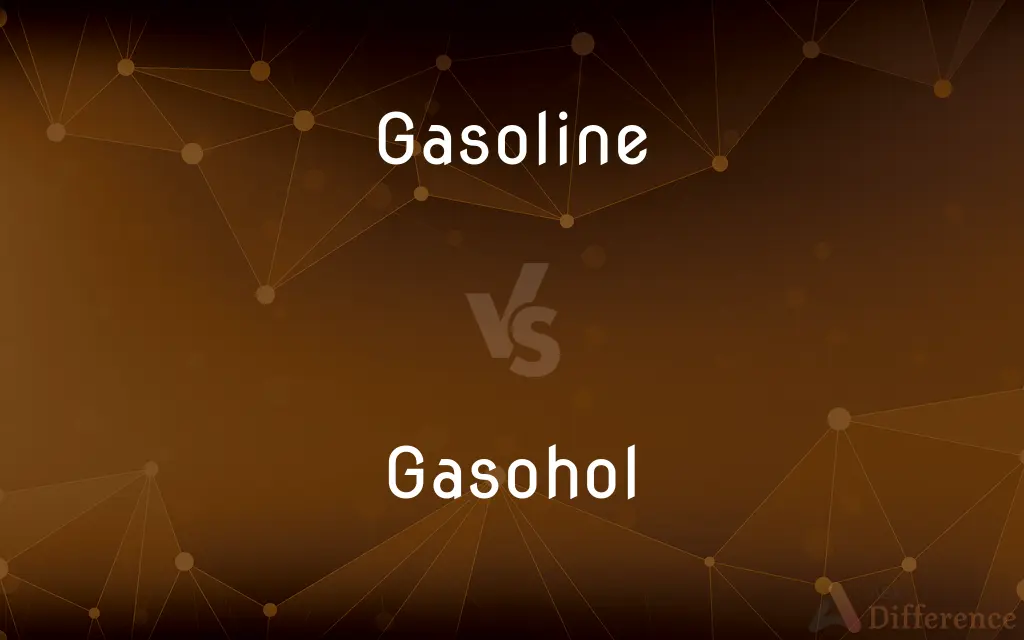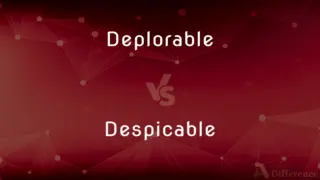Gasoline vs. Gasohol — What's the Difference?
By Urooj Arif & Fiza Rafique — Updated on March 29, 2024
Gasoline is a pure petroleum-derived fuel used in internal combustion engines, while gasohol is a blend of gasoline and ethanol, typically aiming to reduce emissions and reliance on petroleum.

Difference Between Gasoline and Gasohol
Table of Contents
ADVERTISEMENT
Key Differences
Gasoline, a distilled petroleum product, is the traditional fuel for internal combustion engines, offering high energy content and efficiency. Gasohol, on the other hand, is a blend that incorporates ethanol, usually derived from agricultural products like corn or sugarcane, with gasoline. The most common blend is E10, which contains 10% ethanol and 90% gasoline, though other ratios like E15 and E85 exist for different uses and engine types.
The introduction of ethanol into gasoline (to create gasohol) serves multiple purposes: it reduces the overall environmental impact by cutting down on greenhouse gas emissions, decreases dependence on fossil fuels, and supports agricultural industries. While gasoline provides higher energy density, gasohol brings the benefit of being more environmentally friendly and renewable.
The performance of engines running on gasoline versus gasohol can vary. Gasoline engines are optimized for the higher energy content of pure gasoline, while gasohol can slightly lower fuel efficiency due to ethanol’s lower energy content. However, ethanol's higher octane rating in gasohol can improve engine performance by reducing knocking.
Economic factors also play a role in the gasoline vs. gasohol debate. Gasoline's price and availability are subject to crude oil market fluctuations, while gasohol, though potentially more stable due to the renewable nature of ethanol, can be influenced by agricultural market conditions and government policies related to ethanol production.
The transition from gasoline to gasohol reflects broader trends towards sustainable energy and reducing carbon footprints. While gasoline remains dominant in the global fuel market, the increasing use of gasohol and other biofuels is a step towards more sustainable transportation options.
ADVERTISEMENT
Comparison Chart
Composition
100% petroleum-derived
Blend of gasoline and ethanol (e.g., 10% ethanol)
Environmental Impact
Higher emissions
Reduced emissions, more environmentally friendly
Energy Content
Higher energy density
Lower energy density due to ethanol
Performance
Optimized for pure gasoline
Can reduce fuel efficiency, but higher octane can improve performance
Economic Factors
Subject to oil market fluctuations
Influenced by agricultural markets and policies
Sustainability
Less sustainable
More sustainable, supports renewable energy use
Compare with Definitions
Gasoline
A refined petroleum product with high energy density.
Gasoline's efficiency makes it a preferred choice for many drivers.
Gasohol
A blend of gasoline and ethanol used as fuel.
Gasohol is becoming more popular due to its environmental benefits.
Gasoline
A volatile mixture of hydrocarbons for engines.
He filled his tank with gasoline before the long drive.
Gasohol
Contains ethanol, which is derived from biomass.
The ethanol in gasohol is often made from corn or sugarcane.
Gasoline
A liquid fuel derived from petroleum, used primarily in internal combustion engines.
Gasoline is the most common fuel for cars in many countries.
Gasohol
A fuel mixture aimed at reducing emissions.
Many countries are now promoting gasohol to cut down on pollution.
Gasoline
The standard automotive fuel.
Vehicles designed to run on gasoline are widespread.
Gasohol
A step towards sustainable transportation.
Using gasohol is one way to make driving more eco-friendly.
Gasoline
Fuel that powers most traditional vehicles.
The price of gasoline has risen sharply.
Gasohol
Designed to support agricultural industries and reduce fossil fuel use.
Gasohol supports farmers by creating a market for ethanol.
Gasoline
Gasoline () or petrol () (see the etymology for naming differences and the use of the term gas) is a transparent, petroleum-derived flammable liquid that is used primarily as a fuel in most spark-ignited internal combustion engines. It consists mostly of organic compounds obtained by the fractional distillation of petroleum, enhanced with a variety of additives.
Gasohol
A fuel consisting of a blend of ethyl alcohol and unleaded gasoline, especially a blend of 10 percent ethanol and 90 percent gasoline.
Gasoline
A volatile mixture of flammable liquid hydrocarbons derived chiefly from crude petroleum and used principally as a fuel for internal-combustion engines.
Gasohol
Gasoline mixed with ethyl alcohol (ethanol).
Gasoline
A flammable liquid consisting of a mixture of refined petroleum hydrocarbons, mainly used as a motor fuel; petrol.
Gasohol
A gasoline substitute consisting of 90% gasoline and 10% grain alcohol from corn
Gasoline
(countable) Any specific kind of gasoline.
The refinery produces a wide range of gasolines.
Gasoline
Marijuana, especially very potent or high quality.
Gasoline
(slang) An alcoholic beverage made of vodka and energy drink.
Gasoline
Made from or using gasoline.
Gasoline
A highly volatile mixture of fluid hydrocarbons, obtained mostly from petroleum, as also by the distillation of bituminous coal. It is used as a fuel for most automobiles and for many other vehicles with internal combustion engines. The gasoline of commerce is typically blended with additives to improve its performance in internal combustion engines. Gasoline was also used in the early 1900's in making air gas, and in giving illuminating power to water gas. See Carburetor.
Gasoline
A volatile flammable mixture of hydrocarbons (hexane and heptane and octane etc.) derived from petroleum; used mainly as a fuel in internal-combustion engines
Common Curiosities
What is gasohol?
Gasohol is a blend of gasoline and ethanol, designed to reduce environmental impact and reliance on petroleum.
Why is gasohol considered more environmentally friendly?
Gasohol produces fewer greenhouse gas emissions compared to gasoline, due to the inclusion of ethanol.
Can all vehicles use gasohol?
Most modern vehicles can use E10 (10% ethanol blend), but higher ethanol content requires specially designed engines.
What are the economic implications of using gasohol vs. gasoline?
Gasohol can offer more stable pricing influenced by agricultural markets, whereas gasoline prices are tied to the volatile oil market.
Is gasohol less efficient than gasoline?
Yes, due to ethanol's lower energy content, gasohol can slightly decrease fuel efficiency compared to pure gasoline.
How does the ethanol in gasohol impact engine performance?
Ethanol's higher octane rating can improve engine performance by reducing knocking, though overall fuel efficiency may decrease.
What are the challenges in adopting gasohol?
Challenges include compatibility with existing engines, the energy return on energy invested (EROEI) for ethanol, and the impact on food prices and land use.
What is gasoline?
Gasoline is a petroleum-derived fuel used primarily in internal combustion engines for vehicles.
How does gasohol differ from gasoline?
Gasohol contains ethanol, which lowers emissions and supports renewable energy, unlike pure gasoline.
What is the most common gasohol blend?
The most common gasohol blend is E10, which consists of 10% ethanol and 90% gasoline.
Why is gasohol important for sustainable transportation?
Gasohol represents a move towards more sustainable and renewable energy sources, reducing dependence on fossil fuels.
How does gasohol fit into the future of energy?
Gasohol is part of a broader strategy to diversify energy sources, reduce emissions, and transition towards more sustainable energy systems.
What is the role of government policies in promoting gasohol?
Government policies can encourage gasohol use through subsidies for ethanol production and mandates for biofuel blending.
How does gasohol support the agricultural industry?
By creating a demand for ethanol, gasohol provides a market for agricultural products used in ethanol production.
Can the use of gasohol reduce carbon footprints?
Yes, the ethanol component of gasohol can help reduce the carbon footprint of transportation fuels.
Share Your Discovery

Previous Comparison
Fixation vs. Obsession
Next Comparison
Deplorable vs. DespicableAuthor Spotlight
Written by
Urooj ArifUrooj is a skilled content writer at Ask Difference, known for her exceptional ability to simplify complex topics into engaging and informative content. With a passion for research and a flair for clear, concise writing, she consistently delivers articles that resonate with our diverse audience.
Co-written by
Fiza RafiqueFiza Rafique is a skilled content writer at AskDifference.com, where she meticulously refines and enhances written pieces. Drawing from her vast editorial expertise, Fiza ensures clarity, accuracy, and precision in every article. Passionate about language, she continually seeks to elevate the quality of content for readers worldwide.














































